2022 GSO ótĭum Concert IV – Fairy Tale
For its 2022 ótĭum Concert, the Gwangju Symphony Orchestra (GSO) will treat its audiences to three movements—”Scene,” “Waltz,” and “Dance of the Four Swans”—from Swan Lake, widely regarded as the best of Tchaikovsky’s three most renowned ballets. The orchestra will be joined by baritone singer Kong Byung-woo to perform four voice-and-orchestra pieces from Des Knaben Wunderhorn by Gustav Mahler.
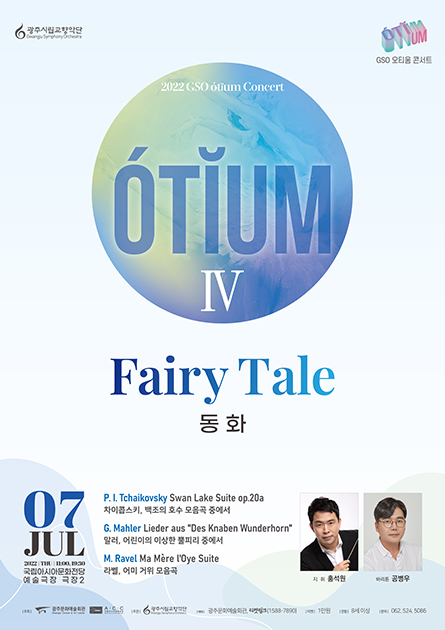
- DateJuly 7, 2022 (Thu.)
- Time11:00, 19:30
- PlaceTheater 2
- Age LimitMust be 8 or older
- Seating446 seats
- Price KRW 10,000 for all seats (Discount Info: Please contact the ticket vendor for details)
- TicketTicket Office
- Contact+82-062-524-5086
- Duration65 min.
About the Concert
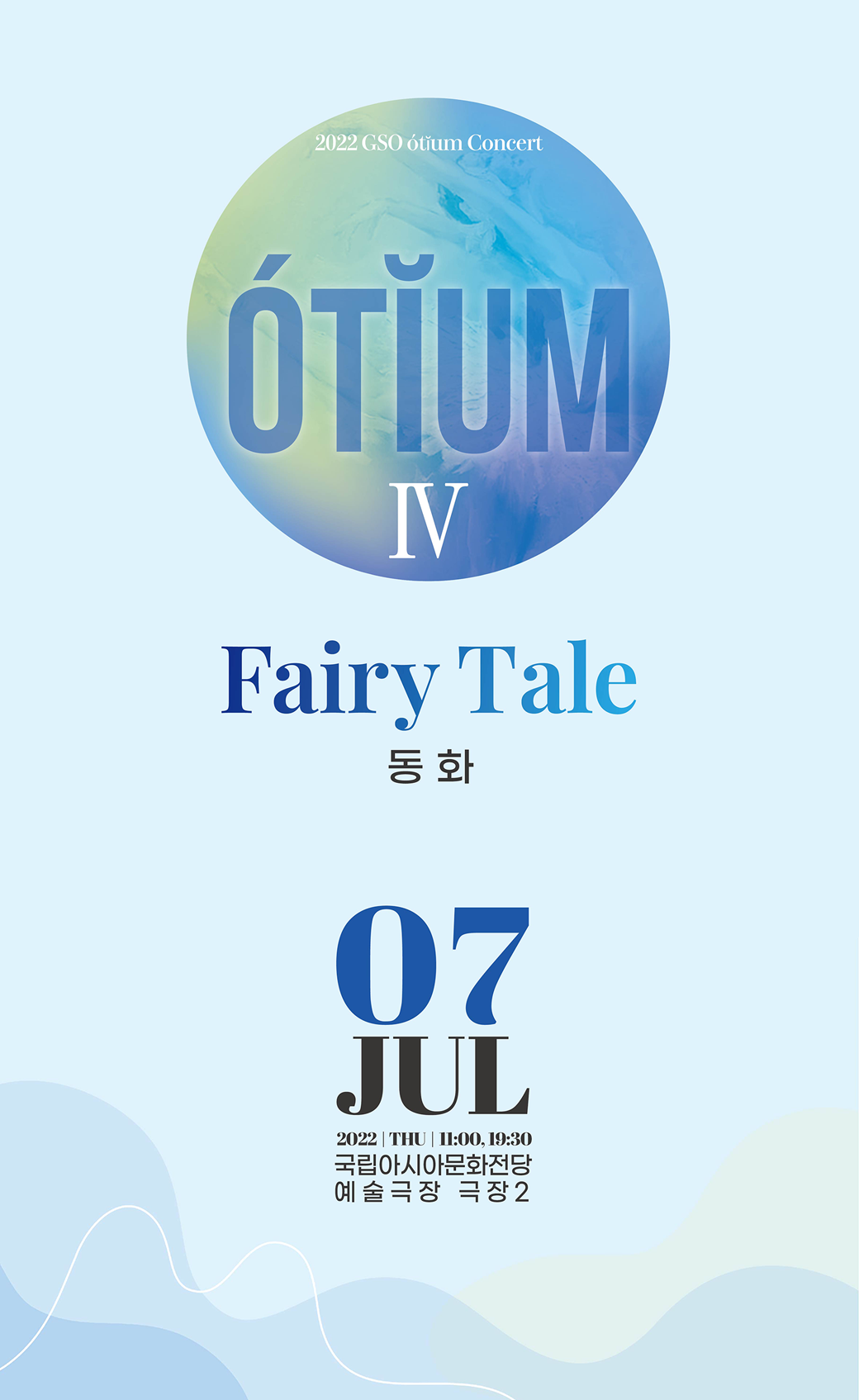
The intense and unique songs of Mahler’s Des Knaben Wunderhorn are based on old lyrics from a folk song collection of the same name. These closely connected songs provide valuable references for unfolding the meaning hidden in the composer’s symphonies.
The latter half of the concert features Maurice Ravel’s Ma Mere l’Oye. Inspired by stories written by Charles Perrault, this collection consists of five songs with their respective titles: Pavane of Sleeping Beauty, Little Tom Thumb, Laideronnette, Empress of the Pagodas, Conversation of Beauty and the Beast, and The Fairy Garden.
Program
- P.I. Tchaikovsky, Swan Lake Suite op.20a
- - Scene
- - Dance of the Four Swans
- - Waltz
- G. Mahler, Lieder aus "Des Knaben Wunderhorn
- - Rhine Legend
- - In Praise Of Lofty Judgement
- - St. Anthony of Paduaʼs Sermon To The Fish
- - Who Thought Up This Little Song?
- M.Ravel, Ma Mere l’Oye : 5 pieces enfantines(Suite)
- Ⅰ. Pavane of Sleeping Beauty
- Ⅱ. Little Tom Thumb
- Ⅲ. Laideronette, Empress of the Pagodas
- Ⅳ. Conversation of Beauty and the Beast
- Ⅴ. The Fairy Garden
Artists
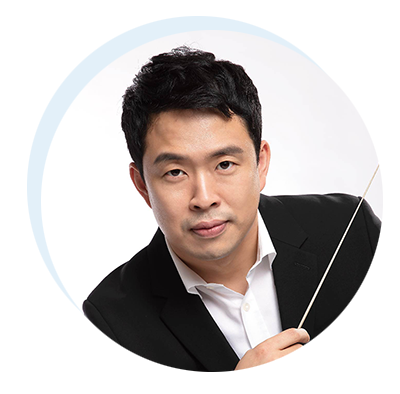
After graduating from the Department of Composition at Seoul National University College of Music as a Conducting Major, and finishing the Diplom and Konzertexamen programs at Universität der Künste Berlin, Germany, Hong was named a Maestro von Morgen (Maestro of the Future) by Deutscher Musikverein and won 3rd prize at the conductor competition celebrating the 100th anniversary of Herbert von Karajan’s birth. He has collaborated with the Deutsches Symphonie-Orchester Berlin, the Konzerthausorchester Berlin, The Stuttgart Radio Symphony Orchestra, and the Beethoven Orchester Bonn. Hong bloomed early on as an opera conductor. He won the Audience Award at the Leipzig Operetta Competition and debuted in venues such as the Stadttheater Bern in Switzerland and the Staatstheater Mainz in Germany to critical acclaim. Hong was also named Kapellmeister for Tiroler Landestheater in Innsbruck. He held the baton for the operetta Die Fledermaus by Johann Strauss II, the love and pride of Austria, which won him 20 sold-out runs and warm reception from critics and the press. “Fantastic music!” wrote Tiroler Tageszeitung, one of Innsbruck’s main local news outlets. “Conductor Hong Seok-won had all the audience members dancing to the music.” The European opera magazine Merker also hailed Hong’s performance, saying that “Conductor Hong Seok-won led the orchestra to the most ideal Strauss sound.”
In Korea, Hong conducted numerous major opera productions including the opera La Traviata performed in celebration of PyeongChang 2018 Winter Olympics, and Manon by Jules Massenet by the National Opera of Korea, which attracted the attention of the classical music scene as the world’s first full opera production since the COVID-19 outbreak in 2020. His conductorship was lauded for his perfect interpretation of the music, which retained European opera traditions. He also garnered high praise as the conductor for the 2021 rendition of Nabucco by the National Opera of Korea, which celebrated the reopening of the National Theater of Korea as well as Liberation Day. He is set to lead the Korean premier of Verdi’s Evening Prayer on the Island of Sicily in June 2022, continuing his unparalleled career as an opera conductor. Having conducted most major orchestras in Korea, Hong is loved and sought out by listeners, critics, and orchestras for his symphony work as well.
As the second Music Director for Hankyung Philharmonic, he drastically upgraded the orchestra and introduced a fresh wind of change in the orchestral music community. Hong became the 13th Art Director for the Gwangju Symphony Orchestra in 2021. Under his leadership, the city orchestra has recorded sold-out runs for most of its concerts, raising the popularity of classical music once again in Gwangju, the city of art.
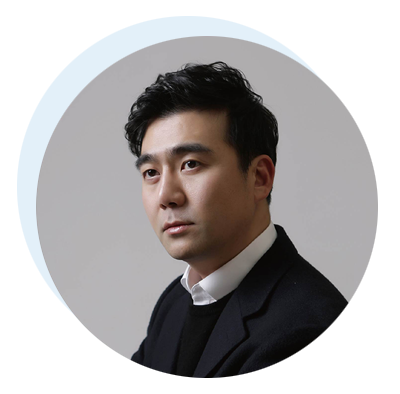
Kong began his career playing Marcello in La bohème at Girona Theatre in Spain, which was then followed by numerous roles, including Count Almaviva in Le Nozze di Figaro in Sabadell in Barcelona, Spain, Guglielmo in Cosi fan tutte in Avignon in France, and Atrace in the baroque opera L’empio punito in Leipzig, Germany, for which he worked with the famous music director Christophe Rousset.
He sang Schaunard in La bohème in Oslo, Norway, and took on the leading role for Don Giovanni in Agder. Fædrelandsvennen, a Norwegian daily newspaper, ran an article about Kong on the front page of its culture section, praising his performance as “Don Giovanni with a rich voice and a witty performance that overwhelms the audience.” Other roles played by the baritone singer include Marcello in La bohème (Massy), Paulo in Simon Boccanegra (Nantes), Figaro in Il Barbiere di Siviglia (Lismo), Ping in Turandot, Dandini in La Cenerentola (Bordeaux), and Allazim in Zaide (Metz). He made his presence known at various prestigious venues across Europe, including Montipellier, where he performed Un ballo in maschera.
In Korea, he once again performed alongside the National Opera of Korea in La bohème, conducted by Chung Myung-whun, where he sang Marcello. He also garnered high praise for his performance in Don Carlo, Don Giovanni, Les pêcheurs de perles, Yevgeniy Onegin at Seoul Arts Center (in which he collaborated with conductor Lü Shao-Chia and the Seoul Philharmonic Orchestra), and Die Zauberflöte which was also performed at the Seoul Arts Center.
His soloist career includes his renditions of Carl Nielsen’s Symphony No. 3 by the Seoul Philharmonic Orchestra under the conductorship of the world-renowned conductor Stephen Asbury, the Ars Nova series of the same orchestra, and a collaboration with the Macao Orchestra. His other performances include a gala concert with the Jeonju Symphony Orchestra, the special concert The Magic Flute at Seoul Arts Center, Schuman Faust Gala at Kumho Art Hall, and Il trittico, which was co-produced by the National Symphony Orchestra of Taiwan and led by Lü Shao-Chia and the National Theater of Taiwan. He currently teaches at the Department of Music in Chonnam National University.

- Music Columnist
- Expert Member, Daewon Cultural Foundation; Editor-in-Chief, Club BALCONY; Chief, JSBACH Production
Career
- 1999-2001Chief Reporter, Piano Music, a piano music magazine published by Eumyeon Co., Ltd
- 2002-2005Chief Reporter and Acting Editor-in-Chief,
JOY CLASSIC, VOX, and CD-Review published by Paradise Media Art, Co., Ltd. - 2005-2006 Music Writer, KBS Music Room, KBS Classic FM
- 2000-2006 Recurring guest, KBS Live Concert and Start with FM, KBS Classic FM (93.1MHz)
- 2006-2016Recurring guest, This is the Silver Era and Happy Seniors, KBS 1 Radio (97.3 MHz)
- 2015-2016Director, STRADEUM, a space of music and culture created by SK Telecom
- 2013-PresentEditor-in-Chief, Club BALCONY, a classical music magazine published by Credia, Co., Ltd
- 2013-PresentChief, JSBACH Production, currently producing Hwanhwa Classic
- 2018-PresentCreator, Internet music program Sul Sul Classic and YouTube Channel Club BALCONY Show
- 2019-PresentExpert Member, Daewoo Cultural Foundation
- 2022-PresentGuest reporter, Hankook Ilbo
Notes
- This performance is intended for visitors aged 8 and above.
- Children below the age of 8 are prohibited from entering the performance hall regardless of the presence of their guardians.
- Please present certified documents to verify visitor’s date of birth (i.e., resident registration, student card, passport, etc.)
- Please note that in the event that a visitor is not allowed into the venue due to age restriction, no cancellation, refund, or change will be made available for the program.
- Tickets can be claimed or purchased 1 hr. before the performance time.
- In order to claim tickets, you are required to present your booking number or the mobile number of the person who has booked the tickets.
- All discounts are applied based on the number of attendees. If you have had any discount applied to you, please present the supporting documents for validation. If not, you will be required to pay the difference to claim the tickets.
- Please be advised that we do not offer same-day changes for discount types, ticket cancellation, and/or refunds.
- In order to ensure the best viewing experience, visitors are not permitted to enter the venue after the program begins.
- Late arrivals will not be allowed into the venue. Please complete the ticket claiming process and enter the venue before the program begins.
- Please park your vehicle at the ACC Parking A.
- All video and audio recordings are strictly prohibited unless agreed upon in advance.
- Food and drinks are not allowed in the venue.
- For the best viewing experience, please make sure to arrive as early as possible.
Place Info.
ACC Theater, Theater 2
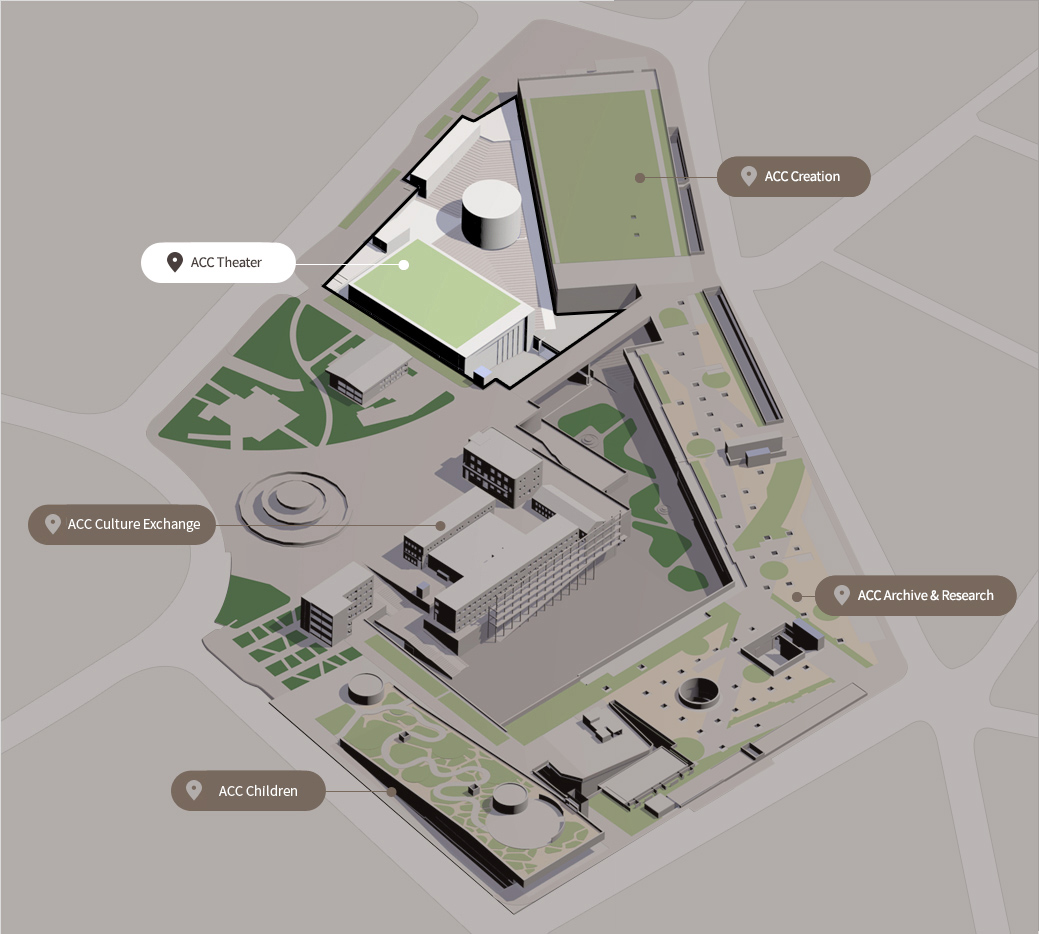
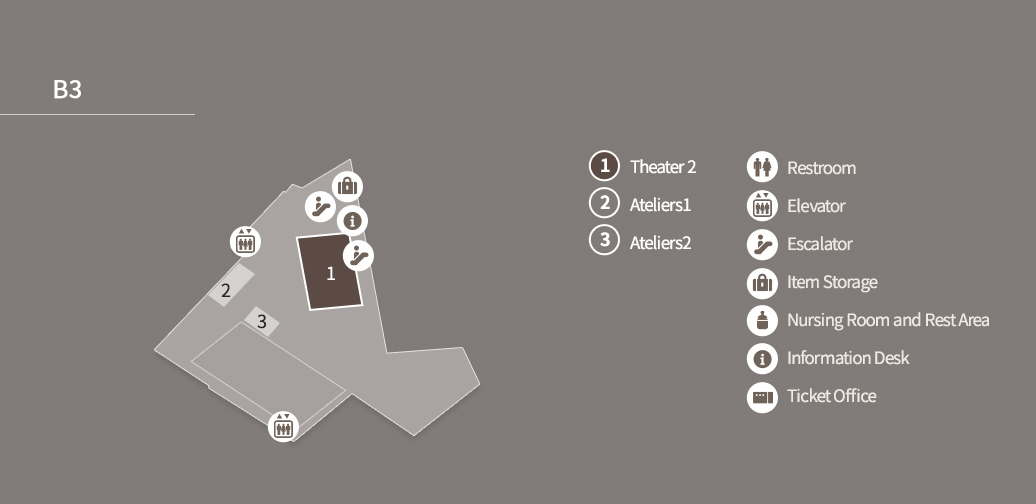
01/


